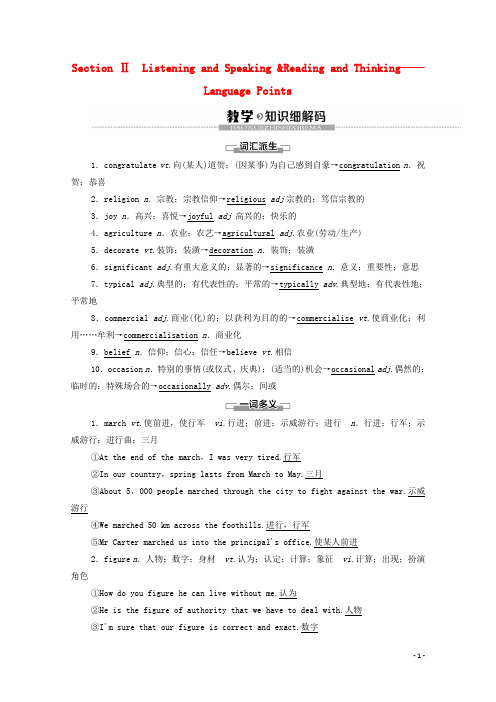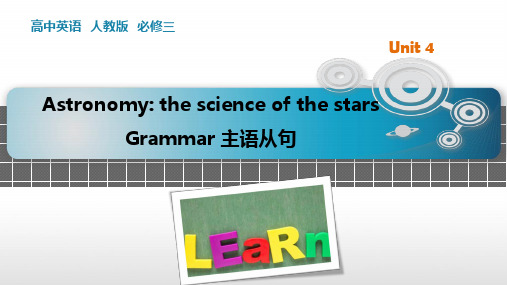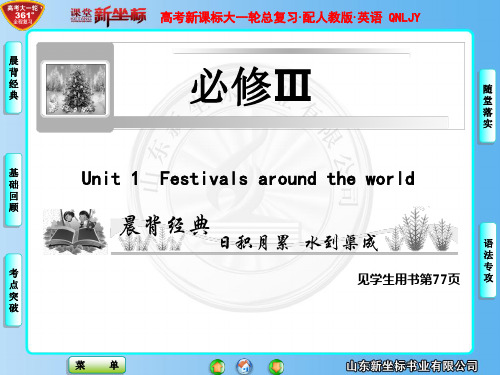必修3第1课语法
- 格式:ppt
- 大小:443.00 KB
- 文档页数:51

Section ⅡListening and Speaking &Reading and Thinking——Language Points1.congratulate vt.向(某人)道贺;(因某事)为自己感到自豪→congratulation n.祝贺;恭喜2.religion n.宗教;宗教信仰→religious adj宗教的;笃信宗教的3.joy n.高兴;喜悦→joyful adj高兴的;快乐的4.agriculture n.农业;农艺→agricultural adj.农业(劳动/生产)5.decorate vt.装饰;装潢→decoration n.装饰;装潢6.significant adj.有重大意义的;显著的→significance n.意义;重要性;意思7.typical adj.典型的;有代表性的;平常的→typically adv.典型地;有代表性地;平常地8.commercial adj.商业(化)的;以获利为目的的→commercialise vt.使商业化;利用……牟利→commercialisation n.商业化9.belief n.信仰;信心;信任→believe vt.相信10.occasion n.特别的事情(或仪式、庆典);(适当的)机会→occasional adj.偶然的;临时的;特殊场合的→occasionally adv.偶尔;间或1.march vt.使前进,使行军vi.行进;前进;示威游行;进行n.行进;行军;示威游行;进行曲;三月①At the end of the march,I was very tired.行军②In our country,spring lasts from March to May.三月③About 5,000 people marched through the city to fight against the war.示威游行④We marched 50 km across the foothills.进行,行军⑤Mr Carter marched us into the principal's office.使某人前进2.figure n.人物;数字;身材vt.认为;认定;计算;象征vi.计算;出现;扮演角色①How do you figure he can live without me.认为②He is the figure of authority that we have to deal with.人物③I'm sure that our figure is correct and exact.数字④She's always had a good figure.身材⑤I hadn't figured on getting home so late.计算、算到⑥I can't figure out how to do this.弄懂Words And Phrases知识要点1 congratulation n .祝贺;恭喜(教材P 2)receive congratulations from...收到来自……的祝贺[例1] I want to express my sincere congratulations on your success. 我想对你的成功表示诚挚的祝贺。





高一年级下(必修3、4)语法情态动词精讲(一)一、情态动词的概念情态动词用来表示说话人对一个动作或状态的看法、态度,即:说话人认为某事“可能”、“或许”、“应该”或是“必须”发生等。
二、情态动词的用法特点1、其不能表示正在发生或已经发生的事情,只表示期待或估计某事的发生。
2、其除ought和have外,后面只能接不带to的不定式。
3、其没有人称、数的变化,即第三人称单数不加-s(have to除外)4、其没有非谓语形式,即没有不定式、分词等形式。
三、一些情态动词的意义和用法1、can和could○1表示能力eg: He can speak both English and French.He could speak French when he was only ten.○2表示客观可能性eg: Anybody can make mistakes.○3表示许可:二者意思基本相同,但can多用于口语。
eg: You can / may sit here.○4用在否定句或疑问句中,表示惊讶、怀疑、猜测或不相信等语气。
eg: That can’t be Tom. He went to London two weeks ago.She can’t be working at this hour.He can’t have told a lie. He is an honest child.2、may和might○1表示请求或允许eg: ---May I leave now?---Yes, you may. / No, you mustn’t.You may use my bike.○2表示说话人的猜测,认为某一事情“或许”、“可能”发生。
eg: She may come tomorrow.She may not go to the party tonight.○3表示祝愿(不用might)eg: May you succeed!May you be lucky!May they live long!3、will和would○1用在疑问句中,表示询问对方的意愿,向对方提出请求。
人教版英语必修3-第一单元u n i t1-b o o k3-词汇-知识点The language points of Unit11. take place 发生;举行(不及物动词)(page1, warming up)take one’s place 找某人接替某人的位置 in place of 代替,用……而不用…… in the first place (列举)首先,第一点 in the last place 最后in one’s place 为某人设身处地想一想 in place 放在原来的位置,就位即学即练:1. 翻译:找到一个代替他的人会很困难。
It would be hard to find a manto__________________.2. take place/ happen/ break out 填空。
The evening party will ___________ on New Year ’s Eve.A big earthquake ___________ in Japan.Flu usually ___________ in winter.2. in memory of 纪念;悼念in need/want of __________ in honor of __________ in case of __________ in praise of __________ in search of __________in charge of __________in possession of __________in favor of __________即学即练:(1) Many Chinese university provide scholarships for student ____ financial aid.A. in favor ofB. in honor ofC. in face ofD. in need of(2) Some students are against my idea while others ____ it.A. in favor ofB. in memory ofC. in honor ofD. in search of(2) He __________ a thick sweater and rushed out.(3) “He almost __________nothing __________, ” shouted the boy.(4) He always __________an old overcoat.4. trick v. trick sb. into doing sth. 诱使某人做某事 trick sb. out of sth. 骗取某人某物 n. play a trick on sb. = play tricks on sb. 即学即练:(1) The students often __________ (开玩笑) each other after class.(2) He was fed up with ____________________(被取笑).5. gain v. 获得,得到 gain from/by 从……中获得即学即练: 翻译下面句子(1) 从我见过他以后,他长胖了不少。